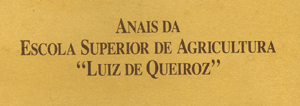Resumo
Leaf samples from coffee plants under three different fertilizations, namely NPK, NP and PK, were collected for chemical analysis. It was found that the contents of N, K, Ca, Mg and S in the first, second, third and fourth pair of leaves were the same from the statistical point of view. On the onder hand, there was a significant effect of the position of the leaf in the branch on the P content, which was higher in the first pair. With the exception of the P level ,the four pairs of leaves are chemically uniform. Nevertheless it is not considered as convenient to mix all kinds of leaves into one sample, since the composition may vary a great deal when sampling is done some other time, such as the period of fruit growing. It is recommended therefore that either the third or the fourth pair leaves should be collected for routine work in foliar diagnosis.
Estudos sobre a alimentação mineral do cafeeiro: XII. efeito da adubação na composição mineral das fôlhas* * Trabalho feito com ajuda do Instituto Brasileiro do Café, da Fundação Rockefeller e do Conselho Nacional de Pesquisas. Agradecimentos são devidos aos alunos do curso optativo de Nutrição de Plantas, ano 1964, que realizaram a amostragem das fôlhas e parte das análises.
E. Malavolta; E.A. Graner; H. P. Haag; J.R. Sarruge
Escola Superior de Agricultura "Luiz de Queiroz", USP Piracicaba, S. Paulo
SUMMARY
Leaf samples from coffee plants under three different fertilizations, namely NPK, NP and PK, were collected for chemical analysis.
It was found that the contents of N, K, Ca, Mg and S in the first, second, third and fourth pair of leaves were the same from the statistical point of view. On the onder hand, there was a significant effect of the position of the leaf in the branch on the P content, which was higher in the first pair.
With the exception of the P level ,the four pairs of leaves are chemically uniform. Nevertheless it is not considered as convenient to mix all kinds of leaves into one sample, since the composition may vary a great deal when sampling is done some other time, such as the period of fruit growing. It is recommended therefore that either the third or the fourth pair leaves should be collected for routine work in foliar diagnosis.
Texto completo disponível apenas em PDF.
Full text available only in PDF format.
LITERATURA CITADA
- ANÔNIMO, 1962. Em "Informe 1962", da Estación Experimental Tropical de Pichilingue (Equador).
- CARVAJAL, J.F. 1963. La toma de muestras foliares en cafetos para fines de diagnostico. Cafe 5:25-33.
- CHAVERRI, G., È. BORNEMISZA & F. CHAVES. 1957 Resultados del analisis foliar del cafe in Costa Rica. STICA, Inf. Técnica 3.
- ESPINOSA, F.M. 1960. El analisis foliar en el diagnostico del estado nutricional del cafeto. Inst. Salvadoreño de Inv. del Café, Bol. Inform. Supl. 2.
- HUERTA, A. 1963. Par de hojas representativo del estado nutricional del cafeto. Cenicafe 14:111-128.
- LOTT, W.L., J.P. NERY, J.R. GALLO & J.C. MEDCALF. 1956. Leaf analysis technique in coffee research. IBEC Res. Inst. Bol. 9.
- LOUÉ, A. 1958. La nutrición mineral del cafeto robusta y su fertilización en la Costa de Marfil. Fertilité 5: 27-60.
- MALAVOLTA, E. & F. PIMENTEL GOMES. 1961 Em "Plant Analysis and Fertilizer Problem", ed. por Walter Reuther, Am. Inst. Biological Sciences, Washington, D.C.
Datas de Publicação
-
Publicação nesta coleção
27 Jun 2012 -
Data do Fascículo
1964

